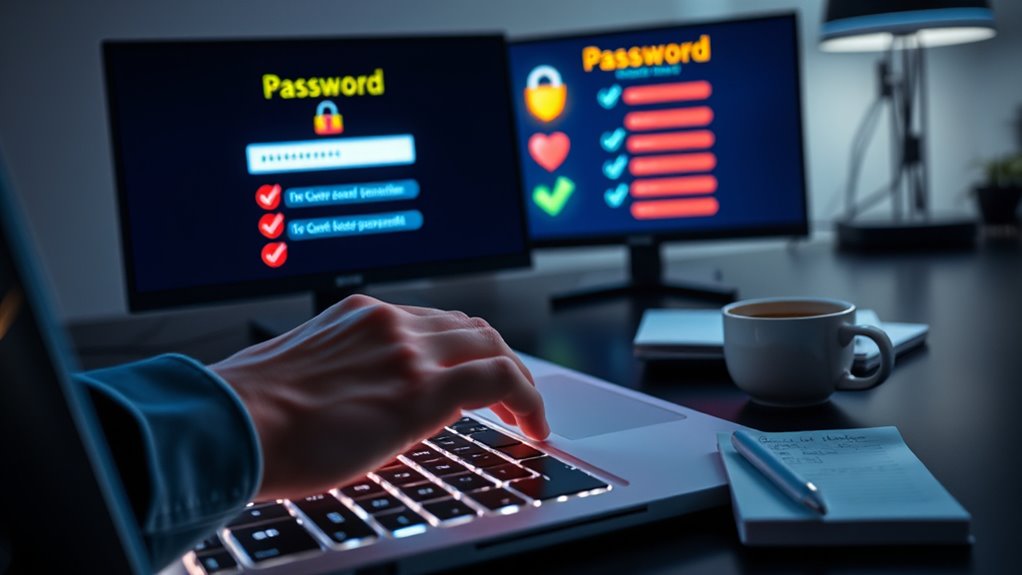To practice password hygiene that really works, create complex, unique passwords combining uppercase, lowercase, numbers, and special characters. Use a password manager to store and generate strong passwords, avoiding reuse across accounts. Enable multi-factor authentication for added security, especially for sensitive accounts. Regularly update your passwords and stay vigilant against phishing attempts. Adopting these habits may seem challenging at first, but the benefits of enhanced protection will become clear as you explore more effective security strategies.
Key Takeaways
- Use strong, complex passwords combining uppercase, lowercase, numbers, and special characters, avoiding common words and personal details.
- Enable multi-factor authentication (MFA) on all sensitive accounts for added security.
- Utilize a reputable password manager to generate, store, and manage unique passwords securely.
- Regularly update passwords, especially for financial and critical accounts, to reduce vulnerability.
- Avoid reusing passwords across sites and practice consistent password hygiene for optimal protection.

Have you ever wondered if your passwords are truly secure? It’s a common question, especially with the increasing number of data breaches and hacking attempts. The truth is, simple or predictable passwords leave you vulnerable. To strengthen your password hygiene, focusing on password complexity is essential. A complex password combines uppercase and lowercase letters, numbers, and special characters, making it much harder for hackers to crack through brute-force attacks. Instead of using common words or phrases, aim for a mix that’s unique and not easily guessable. Avoid using personal details like your birthday or pet’s name, as those are often the first guesses in hacking attempts.
Simple, predictable passwords make you vulnerable—use complex, unique combinations to better protect your accounts.
But password complexity alone isn’t enough. You also need to adopt multi-factor authentication (MFA). MFA adds an extra layer of security by requiring you to verify your identity through two or more methods before gaining access. For example, after entering your password, you might need to input a code sent to your phone or use a biometric scan like a fingerprint or facial recognition. This way, even if someone manages to steal your password, they can’t access your account without the additional verification step. Implementing MFA is one of the most effective ways to protect sensitive information, especially for email accounts, banking apps, and work-related platforms.
When creating passwords, remember that complexity is key, but so is uniqueness. Don’t reuse passwords across multiple sites; if one gets compromised, your other accounts are at risk. Consider using a password manager to generate and store strong, unique passwords for different accounts. This tool relieves the burden of memorizing complex passwords and reduces the temptation to reuse or choose weak ones. Also, periodically update your passwords, especially for accounts holding sensitive or financial data, to reduce the window of opportunity for hackers.
Combining strong password complexity with multi-factor authentication creates a robust barrier against unauthorized access. It’s a simple yet powerful strategy that considerably increases your digital security. While it might require an initial setup effort, the peace of mind it provides is well worth it. Remember, your online security depends on proactive habits. By practicing good password hygiene—using complex, unique passwords and enabling MFA—you take meaningful steps to protect your personal information and digital identity from evolving threats. Additionally, being aware of sleep and mental health can improve your overall cognitive function and decision-making skills, making it easier to manage your online security practices effectively.

NordPass Premium, Unlimited Devices, 2-Year, Password Manager, Digital Code
Automatically fill out login details. Save time online, let NordPass autofill login details for you. All it takes…
As an affiliate, we earn on qualifying purchases.
As an affiliate, we earn on qualifying purchases.
Frequently Asked Questions
How Often Should I Change My Passwords?
You should change your passwords regularly, ideally every three to six months, especially if you notice any signs of a security breach. Maintain password complexity by using a mix of letters, numbers, and symbols, and avoid reusing passwords across multiple accounts. This proactive approach helps reduce risks from password reuse and strengthens your overall security, preventing hackers from easily accessing your personal information. Stay vigilant and update your passwords consistently.
Are Password Managers Secure to Use?
Yes, password managers are generally secure to use, but be aware of potential password manager vulnerabilities. Choose reputable providers with strong encryption, two-factor authentication, and regular security updates. Avoid password sharing risks by never sharing your master password and only using the manager on trusted devices. While they streamline your login process, staying cautious helps protect your sensitive info from breaches or vulnerabilities.
What Makes a Password Truly Strong?
A truly strong password keeps you safe by balancing complexity and uniqueness. It should be unpredictable, mixing uppercase and lowercase letters, numbers, and symbols to boost password complexity. Avoid reusing passwords across sites, because if one is compromised, others fall. The key is creating a password that’s hard to guess yet memorable—don’t let your guard down. Combine these tactics, and your password becomes a powerful shield against cyber threats.
Can Two-Factor Authentication Replace Good Password Habits?
Two-factor authentication (2FA) substantially enhances your security, but it can’t fully replace good password habits. Biometric authentication adds an extra layer, making it harder for hackers to access your accounts. However, if you reuse passwords across sites, you risk widespread breaches. Combining strong, unique passwords with 2FA and biometrics offers the best protection, ensuring your accounts stay secure even if one method is compromised.
How Do I Recover a Compromised Password?
Imagine you notice suspicious activity on your email. First, perform a password reset immediately to regain control. Use your account recovery options, such as linked phone numbers or backup email addresses, to verify your identity. Change your password to a strong, unique one. Keep your security details updated and enable two-factor authentication. Acting quickly helps prevent further damage and secures your account effectively.

Yubico – YubiKey 5C NFC – Multi-Factor authentication (MFA) Security Key and passkey, Connect via USB-C or NFC, FIDO Certified – Protect Your Online Accounts
POWERFUL SECURITY KEY: The YubiKey 5C NFC is the most versatile physical passkey, protecting your digital life from…
As an affiliate, we earn on qualifying purchases.
As an affiliate, we earn on qualifying purchases.
Conclusion
By now, you’ve learned that good password hygiene isn’t just a tiny detail — it’s the fortress protecting your digital life from chaos. Use strong, unique passwords, enable 2FA, and change them regularly. Think of your passwords as the ultimate shield against cyber threats; neglecting them is like inviting a cyber hurricane into your home. Stay vigilant, stay secure, and remember: your digital safety depends on the habits you build today.

Strong password generator
Set up a complex password
As an affiliate, we earn on qualifying purchases.
As an affiliate, we earn on qualifying purchases.

Digital Persona 88003-001U.are.u 4500 Reader 70" Cable
Target Applications – Desktop PC security, Mobile PCs, Custom applications
As an affiliate, we earn on qualifying purchases.
As an affiliate, we earn on qualifying purchases.









